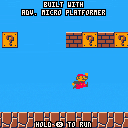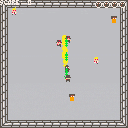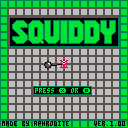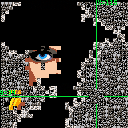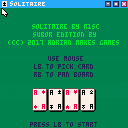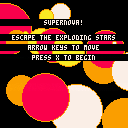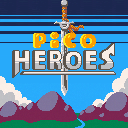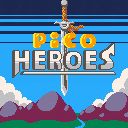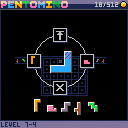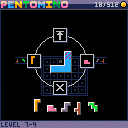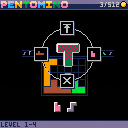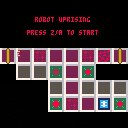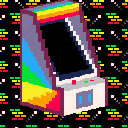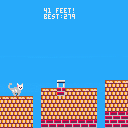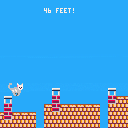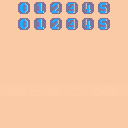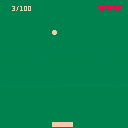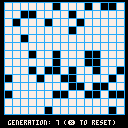Hello lovely pico community!
This is my first game ever released and is still in development. But I enjoyed the local discussions so much so couldn't wait to share. This is a tribute to my wife's favourite childhood game. The goal is to defeat all the fruits going for you. Don't let them touch you! Dig the holes, lure fruits in them and then fill up the hole to defeat a fruit. Some fruits need to fall from higher ground to be defeated.


Testing out my Advanced Micro Platformer Starter Kit's ability to handle 16x16 sprites (vs more common 8x8 used in a lot of pico-8 games).
I ran the Dank Tombs demo cart on my PocketCHIP to find it really grinds...almost to a halt. I know the cart is pushing limits technically and the PocketCHIP isn't for every game - as much as I bang the PocketCHIP drum, I get it.
However, through that brief discussion, I learned that the PocketCHIP doesn't/can't run Pico-8 at full speed...??
Totally sucks given that PocketCHIP really pushes Pico-8 hard. And double stinks because as more people get their hands on Pico-8 and make great, top shelf games (like Dank Tombs) the PocketCHIP won't be able to keep up.
I had plans to make a console for Pico-8 using the Next Thing Console Bundle or maybe try to roll my own with a Raspberry Pi or something...however, if the PocketCHIP can't run things at full speed, does that mean these other devices can't either?
I want to play Pico-8 on my TV instead of on my computer so my kid and I can play without having to be in the office all the time. I've seen a lot of others post Pi consoles and such, which look like a great little project, but I want to make sure things will run as they should, unlike the PocketCHIP apparently.
Any thoughts, insight or first-hand stories is appreciated.







Concept:
This is my first real project on the Pico-8, it is a pretty simple game (kind of a 1 input game), based off rotation mechanics, it's pretty rudimentary yet I tried (and probably failed ^^'') to have a clean code, it has 31 one screen levels and uses the full tilemap space availiable on the cartridge, the code contains multiple functions, categorized under "level status", "drawing functions", "motion functions", "collision functions", and "game loop" (_init, _update and _draw). Even though the difficulty curve is kind of a fail I consider this game to be finished.
Commands:
Use (X) or (O) to change the rotation, and try to get to the end of the level (green square).
[b]Rules:
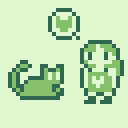



50% PUZZLE GAME, 50% PIXEL-POP-ART PROJECT, 100% WEIRD!
In this old-school cyberpunk-themed game, you are fighting to control the spread of a binary virus in a computer’s memory. By doing so, you progressively reveal the portrait of a famous ‘80s British pop-star. The virus is both friend and foe though, as only recovered memory blocks (those that were once infected) display parts of the hidden picture.
There are two visualisation modes: “scanner” which shows the whole memory, where infected blocks appear as “static” and recovered ones as bits of the background image, and “zoomed in” where both types display a binary number between 0 and 3 (“00”, “01”, “10” and “11”). You toggle between modes by pressing the “Z” key. In both modes, navigation uses the directional (arrow) keys. When you press “Z” while in “scanner” mode to enter “zoomed in” mode, the block that was at the centre of the green crosshair is selected.
While “zoomed in” you can repair memory blocks by swapping them. There is a single rule: you can exchange positions between the selected block and one of its four adjacent neighbours IFF (if and only if) they are both infected AND the neighbour’s number is one unit higher (modulo 4, hence “-P” for “periodic”). In other words: if the selected block is “00” it can be swapped with an adjacent block numbered “01”, “01” with “10”, “10” with “11” and “11” with “00”. To swap, keep “X” pressed while typing the arrow key pointing to the targeted neighbour. After a correct move, the selected block will have changed state from “infected” to “recovered”, the targeted neighbour will have become selected and their binary values will have been swapped.
N.B.: the epidemic pauses while “zoomed in”. “Recovered blocks are immune to the virus and cannot be re-infected. Any infected block completely surrounded by recovered neighbours recovers spontaneously. In “zoomed in” mode, recovered blocks have black digits on white background, infected ones the other way around. The selected block is highlighted (brighter). Susceptible blocks (not yet infected) are marked by two dots. From a fully infected state, there is always at least one solution (i.e. a sequence of 1023 “swap” moves that will result in all blocks being recovered). Good luck finding it though! ;-)



so, here you go, I made a remake of all those keyboard famiclone solitaire games.
so.
you got a cart with some educational stuff on the cart.
one of the games was a port of solitaire, looking and sounding like that (or a version with palm card deck, windows 3.1 styled titlebar, blue background and without auld lang syne in background, but I had that one)
original cart by r1sc.
mod by Adrian Makes Games.
ALSO ON ITCH.IO:
Clickity click!
(CC) 2016 Adrian Makes Games. Made with love.
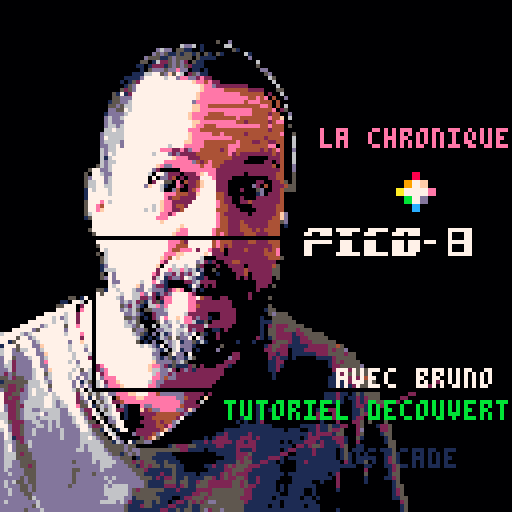
A medieval, European noble names generator
Just my little sunday production. Names generated will sound authentic but are not actual persons.
Includes : Anglo-saxon, French, Germanic, Spanish, Italian and Polish-Lithuanian (credit arian09_01) cultures.
Feel free to reuse the code to save time making your RPG or (grand?) strategy game.


Added a lot to the game, including multiple levels, a second tileset, larger maps, and a prep screen. Next I'll (finally) add enemy AI, and a few story bits.
I started playing Fire Emblem Heroes and have become hooked on the game's simple yet addictive gameplay. So naturally I tried turning it into a pico 8 cart.
This was also a great opportunity to test saving sprites as data strings, and converting them in real time to increase the number of sprites I can have in the game.
This is still very much a work in progress, so let me know what you think of it so far.



Robot Uprising is a Tower Defense style strategy game. Protect the last human base from the attacking robots by placing ground traps or weapon towers.
Accrue metal by destroying robots, or using Metal ground traps. Metal is precious, spend it wisely on your defences... or be personally responsible for the extinction of the human race.
This is a work in progress. Currently the first 8 levels are designed. Another enemy robot type, and hopefully a few
Update:
- when you die, you continue from the current level rather than having to restart from the beginning.


NOT A GAME
Algorithmic Botanic, showing how the sunflower florets sprout. It's called the Phyllotaxis.
Press Left and Right to change the florets' size, Up and Down to mess around with the algorithm. It's a really beautiful thing.
When the algorithm is the "right" one, an exclamation mark show up at the top.
Hey everybody! I'm new to Pico-8 dev, so for a quick project to learn the ropes I threw together a class that lets you program your button-based logic with an event handler, rather than by polling. It probably sucks because it could potentially do a lot of polling, and I used a closure instead of setmetadata to implement the OO (I'm new to both Pico-8 and Lua) but I figured I'd throw it up here in case it could benefit someone.
Here are the features:
- Notifies on button pressed, passing the button number and player number
- Notifies on button released, passing the button number, player number, and total frames the button was pressed
- Can retrieve the current number of frames a button has been pressed at any time
- Number of players can be specified on instantiation, so that only buttons for valid players are polled
Hi all, I've published the first installment of my visual novel "My Guild Leader Is A Demon", which has a soundtrack made mostly in the Pico-8 tracker (a few bits are NES chiptunes I had made before I began this project). You can download the executable for Win/Lin/Mac or watch it as a youtube video: https://0xabad1dea.itch.io/mgliad1
I have the .p8's (and some others I've done) stored at https://github.com/0xabad1dea/0xabad1dea.github.com/tree/master/pico8 if you want to play/inspect them, however, please note that only "tutorial", "raindrops", "castleruins" and "wistful" are allowed to be reused/remixed under cc attribution.

Hi!
I am getting this problem on my linux machine since version 0.1.5, but I've been working on my windows machine only for some time so it didn't annoy me to the point of complaining about it. Now the only machine I have runs linux Red Hat 6 and every since I can't run it. Here is the error I get:
./pico8: /lib64/libc.so.6: version `GLIBC_2.14' not found (required by ./pico8) ./pico8: /lib64/libc.so.6: version `GLIBC_2.15' not found (required by ./pico8) |
Is there something I missed? Some configuration or lib I should get?
I am totally lost here...
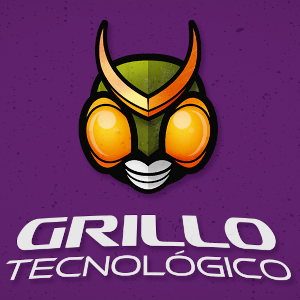

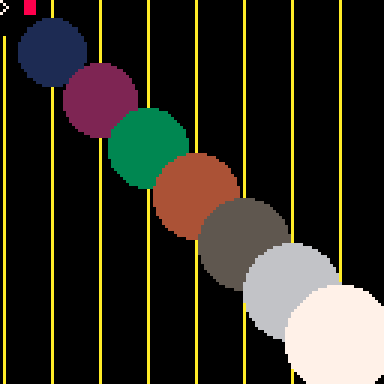
A basic implementation of Conway's Game of Life. A zero player game which simulates the life of a cell with very basic rules.
https://en.wikipedia.org/wiki/Conway's_Game_of_Life
Any live cell with fewer than two live neighbours dies, as if caused by underpopulation.
Any live cell with two or three live neighbours lives on to the next generation.
Any live cell with more than three live neighbours dies, as if by overpopulation.
Any dead cell with exactly three live neighbours becomes a live cell, as if by reproduction.







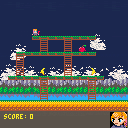
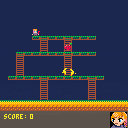
 4 comments
4 comments
